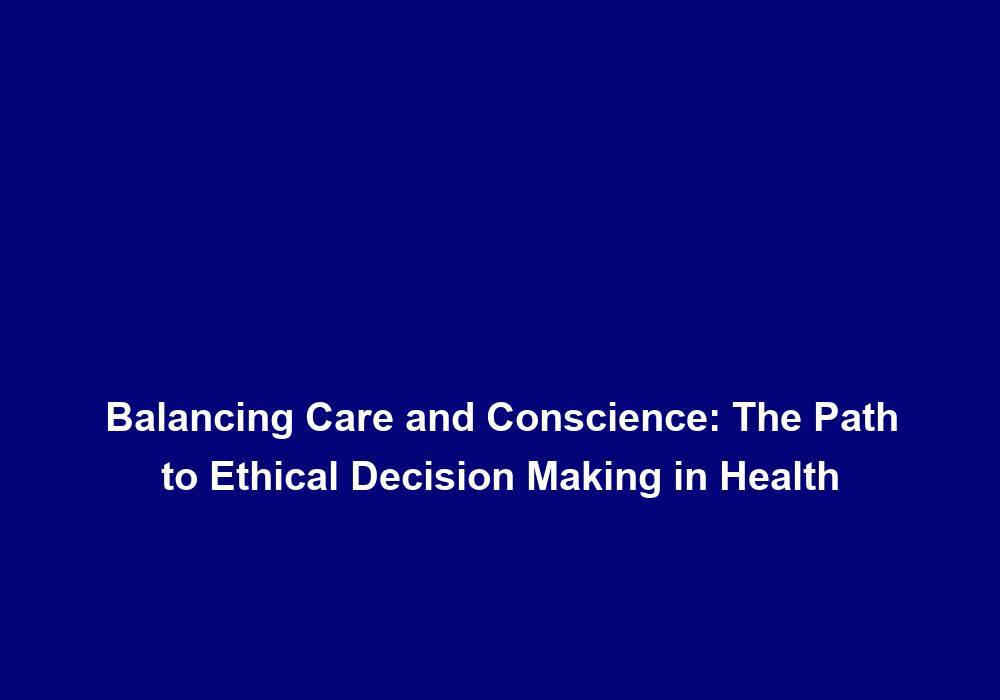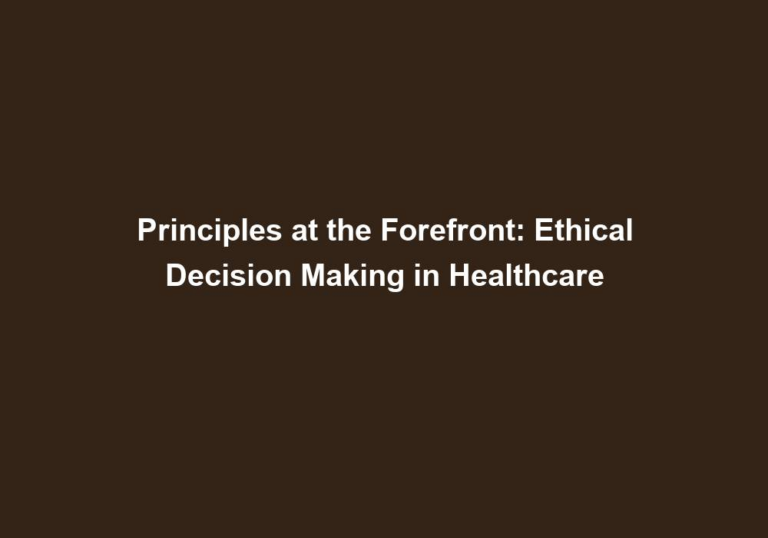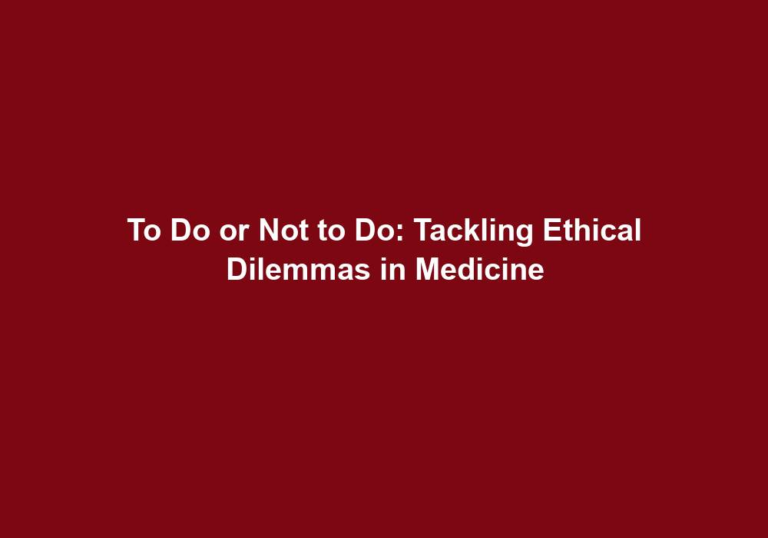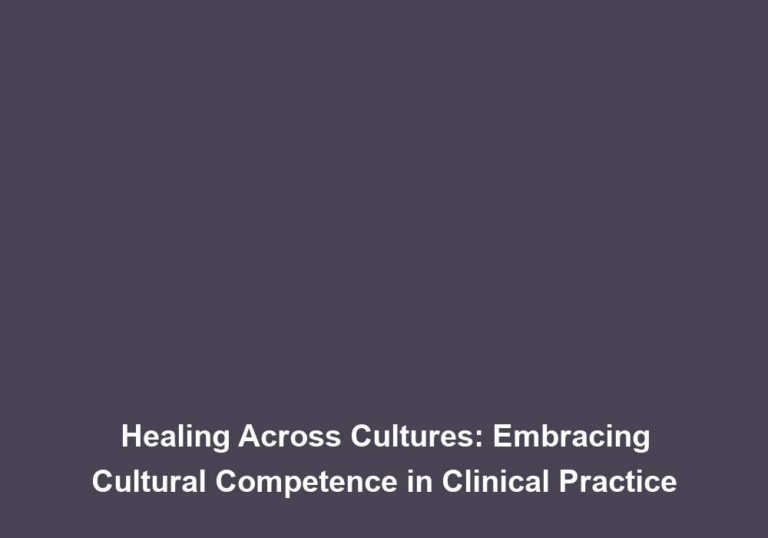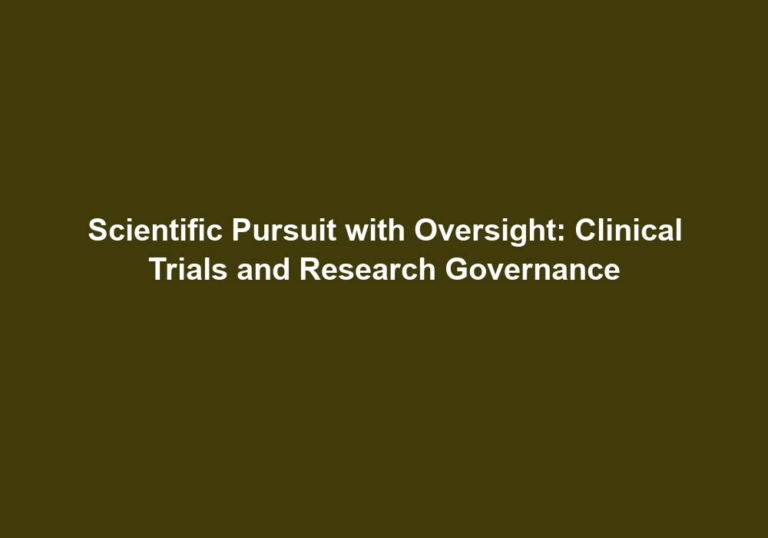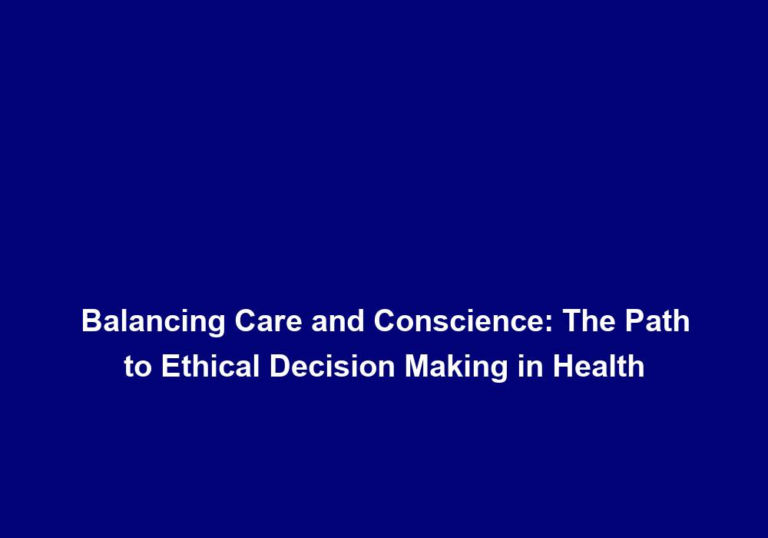Balancing Care and Conscience: The Path to Ethical Decision Making in Health
In the field of healthcare, ethical decision-making plays a crucial role in ensuring patient care is provided in a manner that respects their rights, values, and well-being. Healthcare professionals are constantly faced with complex situations that require careful analysis and consideration of ethical principles. This article aims to delve into the process of ethical decision-making in health, exploring the various factors that influence these decisions and the importance of striking a balance between care and conscience.
Understanding Ethical Decision Making
Ethical decision making involves a systematic approach to resolving moral dilemmas, where conflicting ethical principles or values are at play. Healthcare professionals are often confronted with situations that require them to make difficult choices, such as determining the appropriate course of treatment for a patient or addressing conflicts between patients’ desires and their own ethical beliefs.
Ethical decision making is a complex process that requires healthcare professionals to consider various factors. They must analyze the situation, evaluate the available options, and assess the potential consequences of their decisions. By taking a systematic approach, healthcare professionals can ensure that their decisions are based on ethical principles and are in the best interest of the patient.
The Role of Ethical Principles
Ethical decision making in healthcare is guided by several fundamental principles. These principles provide a framework for healthcare professionals to navigate complex ethical dilemmas and make decisions that are morally sound. The four key ethical principles in healthcare are:
-
Autonomy: Respect for patients’ autonomy by allowing them to make informed decisions about their own healthcare. This principle emphasizes the importance of respecting patients’ rights to self-determination and involving them in the decision-making process.
-
Beneficence: Acting in the best interest of patients and promoting their well-being. Healthcare professionals have a duty to provide care that maximizes benefits and minimizes harm to the patient. This principle requires healthcare professionals to consider the potential benefits and risks of different treatment options and make decisions that prioritize the well-being of the patient.
-
Non-maleficence: Avoiding harm to patients and minimizing risks associated with healthcare interventions. This principle requires healthcare professionals to carefully evaluate the potential risks and benefits of their actions and strive to do no harm to the patient. It emphasizes the importance of avoiding unnecessary risks and ensuring patient safety.
-
Justice: Fair distribution of healthcare resources and treating all patients equitably. This principle emphasizes the importance of fairness and equality in healthcare. Healthcare professionals must consider the needs of all patients and ensure that resources are allocated in a fair and just manner.
These ethical principles often intersect and may require healthcare professionals to balance conflicting interests and values. For example, while respecting a patient’s autonomy, healthcare professionals must also consider the potential harm or risks involved in their decisions. By considering these ethical principles, healthcare professionals can make informed and morally sound decisions.
Factors Influencing Ethical Decision Making
Several factors influence the ethical decision-making process in healthcare. These factors must be taken into account to ensure that decisions are made in a manner that upholds ethical principles and respects patient rights. The key factors influencing ethical decision making include:
1. Personal Values and Beliefs
Healthcare professionals bring their own set of values and beliefs to the decision-making process. These personal values may include religious, cultural, or moral perspectives that shape their understanding of what is right or wrong. It is important for healthcare professionals to recognize and reflect upon their own biases to ensure that their decisions align with ethical principles and respect patients’ autonomy.
Personal values and beliefs can influence the way healthcare professionals perceive and interpret ethical dilemmas. By being aware of their own values and biases, healthcare professionals can make conscious efforts to separate personal beliefs from professional decision making and ensure that decisions are based on ethical principles and the best interest of the patient.
2. Legal and Regulatory Framework
The legal and regulatory framework in which healthcare professionals operate provides guidelines and boundaries for ethical decision making. Laws and regulations help protect patient rights, ensure privacy and confidentiality, and promote ethical practices. Healthcare professionals must be aware of these regulations and consider them in their decision-making process.
The legal and regulatory framework sets the foundation for ethical decision making in healthcare. It provides healthcare professionals with a framework within which they must operate and make decisions. By understanding and adhering to legal and regulatory requirements, healthcare professionals can ensure that their decisions are in line with ethical standards and patient rights.
3. Professional Codes of Ethics
Professional organizations, such as medical associations or nursing boards, have established codes of ethics that guide healthcare professionals in their practice. These codes provide a framework for ethical decision making and offer guidance on various ethical issues. Healthcare professionals should familiarize themselves with these codes and use them as a reference when facing ethical dilemmas.
Professional codes of ethics provide healthcare professionals with a set of guidelines and principles to follow in their practice. These codes outline the ethical obligations and responsibilities of healthcare professionals and help them navigate ethical dilemmas. By referring to these codes, healthcare professionals can ensure that their decisions are aligned with professional standards and ethical principles.
4. Patient’s Best Interest
The primary focus of ethical decision making in healthcare is the best interest of the patient. Healthcare professionals must consider the potential benefits and risks associated with different treatment options and make decisions that prioritize the well-being of the patient. This may involve engaging in open and honest discussions with patients, ensuring they are well-informed about their condition and the available treatment options.
When making decisions, healthcare professionals must carefully consider the impact of their choices on the patient’s well-being. They must take into account the patient’s preferences, values, and goals. By involving the patient in the decision-making process and considering their best interest, healthcare professionals can ensure that their decisions are patient-centered and ethically sound.
5. Collaborative Decision Making
Ethical decision making in healthcare often requires collaboration among healthcare professionals, patients, and their families. Engaging in shared decision making ensures that all stakeholders contribute to the decision-making process, enabling a more comprehensive and patient-centered approach. This collaborative approach helps balance the perspectives and values of different individuals involved, enhancing the overall ethical decision-making process.
Collaborative decision making fosters a sense of partnership and shared responsibility among healthcare professionals, patients, and their families. By involving all stakeholders in the decision-making process, healthcare professionals can gain valuable insights and perspectives. This collaborative approach helps ensure that decisions are made in the best interest of the patient, taking into account their preferences and values.
The Importance of Balancing Care and Conscience
Balancing care and conscience is essential in ethical decision making in health. While providing care and promoting patients’ well-being is of utmost importance, healthcare professionals must also consider their own ethical beliefs and integrity. Striking a balance between care and conscience ensures that ethical decisions are made with compassion and respect for both patients and healthcare professionals.
When care takes precedence over conscience, healthcare professionals may compromise their ethical beliefs and engage in practices that go against their values. This can lead to a loss of professional integrity and potentially harm the patient. Conversely, when conscience dominates care, healthcare professionals may let personal biases or judgments influence their decisions, potentially neglecting the well-being and autonomy of their patients.
By finding a harmonious balance between care and conscience, healthcare professionals can navigate complex ethical dilemmas more effectively. This balance allows for the delivery of ethical and compassionate care while respecting the autonomy and well-being of patients.
Conclusion
Ethical decision making in health is a complex and multifaceted process. Healthcare professionals must navigate conflicting values, legal frameworks, and patient interests to make decisions that align with ethical principles. By recognizing personal biases, considering legal and regulatory frameworks, and prioritizing patient autonomy and well-being, healthcare professionals can strike a balance between care and conscience and ensure ethical decision making in health.

